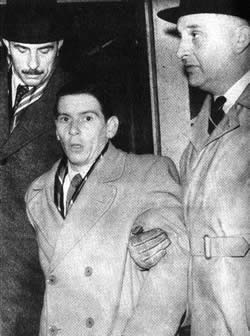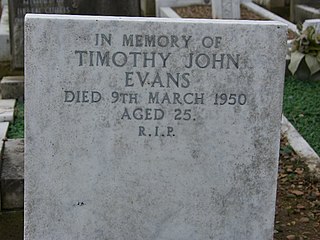Related Research Articles
David Milgaard was a Canadian man who was wrongfully convicted for the 1969 rape and murder of nursing student Gail Miller in Saskatoon and imprisoned for 23 years. He was eventually released and exonerated. Up until his death, he lived in Alberta and was employed as a community support worker. Milgaard was also a public speaker who advocated for the wrongfully convicted and for all prisoners' rights.

Timothy John Evans was a Welshman who was wrongfully accused of murdering his wife Beryl and infant daughter Geraldine at their residence in Notting Hill, London. In January 1950, Evans was tried and convicted of the murder of his daughter, and on 9 March he was executed by hanging.
The Guildford Four and Maguire Seven were two groups of people, mostly Northern Irish, who were wrongly convicted in English courts in 1975 and 1976 of the Guildford pub bombings of 5 October 1974 and the Woolwich pub bombing of 7 November 1974. All the convictions were eventually overturned in 1989 and 1991 after long campaigns for justice, and the cases, along with those of the Birmingham Six, diminished public confidence in the English criminal justice system.

A miscarriage of justice occurs when an unfair outcome occurs in a criminal or civil proceeding, such as the conviction and punishment of a person for a crime they did not commit. Miscarriages are also known as wrongful convictions. Innocent people have sometimes ended up in prison for years before their conviction has eventually been overturned. They may be exonerated if new evidence comes to light or it is determined that the police or prosecutor committed some kind of misconduct at the original trial. In some jurisdictions this leads to the payment of compensation.
The West Midlands Serious Crime Squad was a police unit in the English West Midlands which operated from 1974 to 1989. It was disbanded after an investigation into allegations of incompetence and abuse of power on the part of some of the squad's members. Some of this misconduct resulted in wrongful convictions, including the high-profile case of the Birmingham Six. The sister Regional Crime Squad based at Bilston was responsible for the investigation of the Bridgewater Four.

South Wales Police is one of the four territorial police forces in Wales. It is headquartered in Bridgend.
David Harold Eastman is a former public servant from Canberra, Australia. In 1995, he was wrongfully convicted of the murder of Australian Federal Police Assistant Commissioner Colin Winchester and was sentenced to life imprisonment without parole. A 2014 judicial inquiry recommended the sentence be quashed and he should be pardoned. On 22 August of the same year, the Supreme Court of the Australian Capital Territory quashed the conviction, released Eastman from prison, and ordered a retrial.
Wrongful execution is a miscarriage of justice occurring when an innocent person is put to death by capital punishment. Opponents of capital punishment often cite cases of wrongful execution as arguments, while proponents argue that innocence concerns the credibility of the justice system as a whole and does not solely undermine the use of the death penalty.

Fritz Yngvar Moen was a Norwegian man wrongfully convicted of two distinct murders, serving a total of 18 years in prison. After the convictions were quashed, an official inquiry was instigated to establish what had gone wrong in the authorities' handling of the case, and on 25 June 2007 the commission delivered harsh criticism to the police, the prosecution and the courts in what was immediately termed Norway's worst miscarriage of justice of all time.
The Norfolk Four are four former United States Navy sailors: Joseph J. Dick Jr., Derek Tice, Danial Williams, and Eric C. Wilson, who were wrongfully convicted of the 1997 rape and murder of Michelle Moore-Bosko while they were stationed at Naval Station Norfolk. They each declared that they had made false confessions, and their convictions are considered highly controversial. A fifth man, Omar Ballard, confessed and pleaded guilty to the crime in 2000, insisting that he had acted alone. He had been in prison since 1998 because of violent attacks on two other women in 1997. He was the only one of the suspects whose DNA matched that collected at the crime scene, and whose confession was consistent with other forensic evidence.

Teresa Elena De Simone was murdered in Southampton, England, in 1979. Her murder led to one of the longest proven cases of a miscarriage of justice in English legal history. The murder occurred outside the Tom Tackle pub and was the subject of a three-year police investigation which resulted in the arrest of Sean Hodgson. Hodgson was convicted of the murder by a unanimous jury verdict in 1982 and was sentenced to life imprisonment. After serving 27 years in prison he was exonerated and released in March 2009. DNA analysis of semen samples that had been preserved from the original crime scene showed that they could not have come from him.
Rough Justice is a British television programme that was broadcast on BBC, and which investigated alleged miscarriages of justice. It was broadcast between 1982 and 2007 and played a role in overturning the convictions of 18 people involved in 13 separate cases where miscarriages of justice had occurred. The programme was similar in aim and approach to The Court of Last Resort, the NBC programme that aired in the United States from 1957–58. It is credited with contributing to the establishment of the Criminal Cases Review Commission in 1997.
Mr. Big is a covert investigation procedure used by undercover police to elicit confessions from suspects in cold cases. Police officers create a fictitious grey area or criminal organization and then seduce the suspect into joining it. They build a relationship with the suspect, gain their confidence, and then enlist their help in a succession of criminal acts for which they are paid. Once the suspect has become enmeshed in the criminal gang, they are persuaded to divulge information about their criminal history, usually as a prerequisite for being accepted as a member of the organization.

Lynette Deborah White was murdered in Cardiff, Wales. South Wales Police issued a photofit image of a bloodstained, white male seen in the vicinity at the time of the murder but were unable to trace the man. In November 1988, the police charged five men with White's murder, although none of the scientific evidence discovered at the crime scene could be linked to them. In November 1990, following what was then the longest murder trial in British history, three of the men were found guilty and sentenced to life imprisonment.
Andrew Evans is an English soldier from Longton, Staffordshire who was wrongfully convicted and served 25 years in jail after confessing to the 1972 murder of Judith Roberts, a 14-year-old schoolgirl from a village close to the northern outskirts of nearby Tamworth. Evans was stationed at Whittington Barracks near Lichfield – an army base in close proximity to Tamworth – when Judith was dragged from her bicycle and battered to death in June 1972. He later confessed to the crime after seeing the girl's face in a dream.
Teina Pora is a New Zealander with foetal alcohol syndrome disorder, who made a false confession to the police, and was wrongfully convicted of murdering a woman he had never met, named Susan Burdett, when he was aged 17; he served 20 years in Paremoremo prison from 1994, until he was paroled in 2014.

O'Brien v Chief Constable of South Wales Police [2005] UKHL 26 was an English evidence law decision of the House of Lords which held that evidence of previous bad behaviour, known as similar fact evidence, may be admitted in civil case proceedings if it is probative of a relevant matter.
Robert Brown is a Scottish man who spent 25 years in jail for a crime he did not commit, the murder of worker Annie Walsh.
The New Zealand Criminal Cases Review Commission is an independent Crown entity that was set up under the Criminal Cases Review Commission Act 2019 to investigate potential miscarriages of justice. If the Commission considers a miscarriage may have occurred, it can refer the case back to the Court of Appeal to be reconsidered.
Simon Hall was a British murderer who was the subject of a lengthy campaign by miscarriage of justice activists to overturn his conviction, only for him to go on to confess to the murder he was convicted of. Hall stabbed 79-year-old pensioner Joan Albert to death in her home in Capel St Mary, Suffolk in 2001, and was convicted of her murder two years later. Subsequently, the high-profile miscarriage of justice programme Rough Justice took up his case and aired a programme campaigning for him. Several MPs, Bristol University's 'Innocence Project' campaign group, his mother and his girlfriend Stephanie Hall were also involved in campaigning for him, and the Criminal Cases Review Commission referred his case to the Court of Appeal in 2009. However, the appeal court dismissed the appeal and he subsequently confessed his crime to prison authorities in 2013, before committing suicide in prison in 2014. His case was said to have gravely undermined the claims of many prisoners who claim their innocence and embarrassed miscarriage of justice activists, having proved that they had campaigned for a guilty man.
References
- 1 2 3 4 5 6 7 Buncombe, Andrew (18 December 1999). "Court frees three over killing of newsagent". The Independent. Retrieved 15 April 2011.
- 1 2 3 4 Hammond, Anne (12 October 2006). "Police pay out nearly £1m to Newsagent Three". South Wales Echo. Retrieved 15 April 2011.
- ↑ Mike O'Brien on the Simms and O'Brien law, 2 April 2017, retrieved 28 July 2021